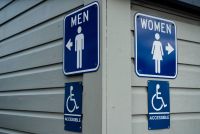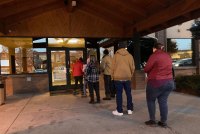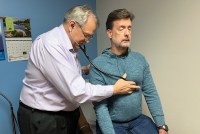Latest KFF Health News Stories
Montana, an Island of Abortion Access, Preps for Consequential Elections and Court Decisions
A 25-year-old state Supreme Court ruling protects abortion rights in conservative Montana. That hasn’t stopped Republicans and anti-abortion advocates from trying to institute a ban.
Concerns Grow Over Quality of Care as Investor Groups Buy Not-for-Profit Nursing Homes
For-profit groups own more than 70% of U.S. nursing homes. Industry leaders and researchers wonder whether corporations and investors can succeed where not-for-profit organizations have struggled. Or, will quality of care suffer in the name of making money?
Avanzan en varios estados proyectos de ley extremos sobre el uso de baños por género
Al menos uno de los proyectos de ley es tan extremo como para proponer que se considere delito que una persona transgénero entre en una instalación que no coincida con el sexo indicado en su acta de nacimiento.
What the Health? From KFF Health News: Alabama’s IVF Ruling Still Making Waves
Lawmakers in Congress and state legislatures are scrambling to react to the ruling by the Alabama Supreme Court that frozen embryos created for in vitro fertilization are legally children. Abortion opponents are divided among themselves, with some supporting full “personhood” for fertilized eggs, while others support IVF as a moral way to have children. Rachel Cohrs of Stat, Riley Griffin of Bloomberg News, and Joanne Kenen of the Johns Hopkins University schools of nursing and public health and Politico Magazine join KFF Health News’ Julie Rovner to discuss these issues and more. Also this week, Rovner interviews University of Pittsburgh law professor Greer Donley, who explains how a 150-year-old anti-vice law that’s still on the books could be used to ban abortion nationwide. Plus, for “extra credit,” the panelists suggest health policy stories they read this week that they think you should read, too.
Bathroom Bills Are Back — Broader and Stricter — In Several States
State lawmakers are resurrecting and expanding efforts to prohibit transgender people from using public restrooms and other spaces that match their gender. Some have sought to ban trans people from “sex-designated spaces,” including domestic violence shelters and crisis centers, which experts say could violate anti-discrimination laws and jeopardize federal funding.
Pregnancy Care Was Always Lacking in Jails. It Could Get Worse.
A lack of oversight and standards for pregnancy care in jails is becoming more problematic as the number of incarcerated women rises and abortion restrictions put medical care further out of reach.
Colorado Legal Settlement Would Up Care and Housing Standards for Trans Women Inmates
A soon-to-be-finalized legal settlement would offer transgender women in Colorado prisons new housing options, including a pipeline to the Denver Women’s Correctional Facility. The change comes amid a growing number of lawsuits across the country aimed at improving health care access and safety for incarcerated trans people.
More ‘Navigators’ Are Helping Women Travel to Have Abortions
After the U.S. Supreme Court ended the federal right to an abortion and many states banned the procedure, reproductive health care organizations hired dozens of people to help patients arrange travel and pay for care.
As climate change-driven wildfires increasingly choke large parts of the United States with smoke each summer, new research shows residents in long-term care facilities are being exposed to dangerously poor air, even those who don’t set foot outside during smoke events.
“Peor de lo que la gente cree”, cambios en Medicaid crean caos en los estados
Tanto beneficiarios como defensores de pacientes dicen que los funcionarios de Medicaid enviaron formularios de renovación obligatoria a direcciones viejas, calcularon mal los niveles de ingresos e hicieron malas traducciones de los documentos.
‘Worse Than People Can Imagine’: Medicaid ‘Unwinding’ Breeds Chaos in States
As Medicaid programs across the nation review enrollees’ status in the wake of the pandemic, patients struggle to navigate the upheaval.
A Decades-Long Drop in Teen Births Is Slowing, and Advocates Worry a Reversal Is Coming
After three decades of declines in teen pregnancies, data shows the rates are starting to plateau. The reversal of “Roe v. Wade,” coupled with efforts to suspend sex education in schools and higher rates of youth mental health issues post-pandemic, could culminate in a perfect storm.
Con cambios en Medicaid, residentes de zonas rurales se sienten abandonados a su suerte
En las zonas rurales, la falta de acceso a navegadores, las personas que ayudan a los beneficiarios de Medicaid a mantener su cobertura o encontrar otro seguro si ya no reúnen los requisitos, podría agravar estas dificultades.
How Will Rural Americans Fare During Medicaid Unwinding? Experts Fear They’re on Their Own
As states review their Medicaid rolls after the expiration of a pandemic-era prohibition against kicking recipients off the government insurance program, experts say the lack of help available to rural Americans in navigating insurance options puts them at greater risk of losing health coverage than people in metropolitan areas.
Doctors and Patients Try to Shame Insurers Online to Reverse Prior Authorization Denials
Prior authorization is a common tool used by health insurers for many tests, procedures, and prescriptions. Frustrated by the process, patients and doctors have turned to social media to publicly shame insurance companies and elevate their denials for further review.
With More People Giving Birth at Home, Montana Passed a Pair of Laws to Make It Easier
The state now requires Medicaid to cover midwife services and has expanded the list of prescription drugs midwives can administer.
Groups Sue to Overturn Idaho ‘Abortion Trafficking’ Law Targeting Teens
It is illegal to help a minor obtain an abortion in Idaho or leave the state for one without parental consent. The lawsuit says the ban infringes on the right to interstate travel and First Amendment freedoms.
Idaho Drops Panel Investigating Pregnancy-Related Deaths as US Maternal Mortality Surges
Amid a years-long rise in maternal mortality rates in the United States, Idaho lawmakers decided to disband a committee created to investigate pregnancy-related deaths.
As Fewer MDs Practice Rural Primary Care, a Different Type of Doctor Helps Take Up the Slack
The number of DOs is surging, and more than half of them practice in primary care, including in rural areas hit hard by doctor shortages.
More States OK Postpartum Medicaid Coverage Beyond Two Months
Montana, Alaska, Mississippi, Missouri, South Dakota, Texas, Utah, and Wyoming are among the latest states moving to provide health coverage for up to a year after pregnancy through the federal-state health insurance program for low-income people.























